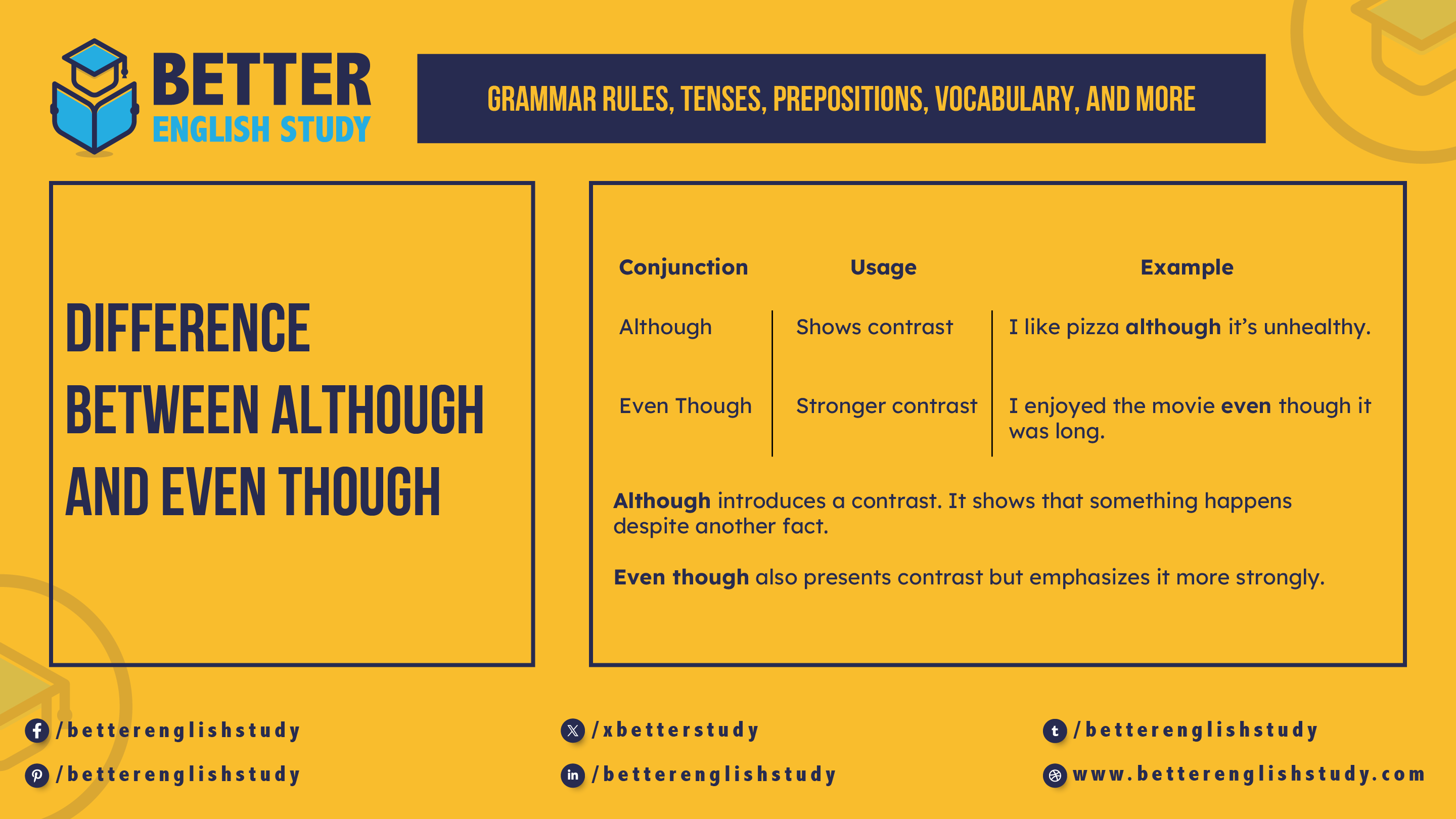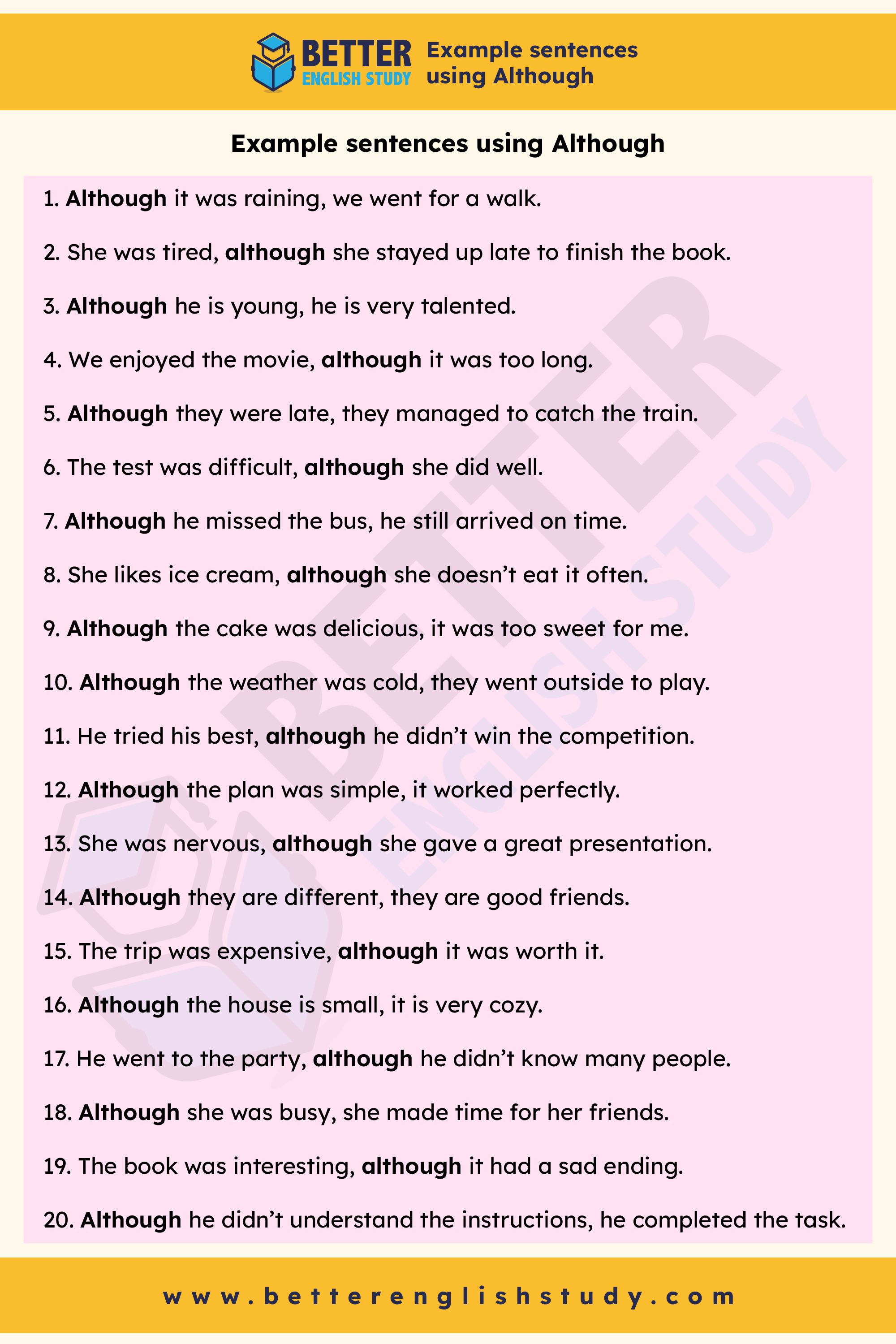
“Although” introduces a contrast but can imply a weaker opposition than “even though,” which emphasizes a stronger contradiction. For example, “Although it was raining, we went outside,” versus “Even though it was raining, we went outside.”
By mastering these distinctions, you’ll improve your communication skills and express your thoughts with greater precision. This understanding is crucial for both casual conversations and formal writing.
Introduction To Conjunctions
Conjunctions connect words, phrases, and clauses in sentences. They help make sentences clear and complete. Two common conjunctions are although and even though.
Although introduces a contrast. It shows that something happens despite another fact. For example, “She went outside although it was raining.”
Even though also presents contrast but emphasizes it more strongly. For instance, “He smiled even though he was sad.” This phrase shows a deeper feeling.
| Conjunction | Usage | Example |
|---|---|---|
| Although | Shows contrast | “I like pizza although it’s unhealthy.” |
| Even Though | Stronger contrast | “I enjoyed the movie even though it was long.” |
Basics Of ‘although’ And ‘even Though’
Although is a word used to show contrast. It introduces a statement that makes another statement seem surprising. For example, “Although it was raining, we went outside.” This means rain didn’t stop the action.
Even though is similar but adds more emphasis. It highlights the contrast even further. An example is, “Even though it was raining heavily, we decided to play.” Here, the rain is more intense, yet the action continues.
| Word | Usage | Example |
|---|---|---|
| Although | Shows basic contrast | Although he was tired, he finished his homework. |
| Even though | Shows stronger contrast | Even though she was sick, she attended the party. |
Comparative Analysis
Although and even though show contrast in sentences. They often mean the same thing. Both introduce a surprising idea or fact. For example, “Although it rained, we played.” This sentence means rain did not stop the game.
Another example is, “Even though it was cold, she wore a dress.” Here, cold weather did not change her choice. Both phrases can be used interchangeably in many sentences.
Key differences exist between the two. Although is more formal than even though. Use “even though” for stronger contrasts. It adds emphasis to the surprising part of the sentence.
Here’s a comparison table to highlight the differences in tone between “Although” and “Even though.” Both can be used to introduce contrasting ideas, but “even though” often emphasizes the contrast more strongly.
| Sentence with “Although” | Sentence with “Even though” |
|---|---|
| Although it was raining, we went for a walk. | Even though it was raining, we went for a walk. |
| Although she was tired, she stayed up to finish the project. | Even though she was exhausted, she stayed up to finish the project. |
| Although I don’t like spicy food, I tried the dish. | Even though I hate spicy food, I tried the dish. |
| Although they arrived late, they didn’t miss much of the movie. | Even though they arrived late, they didn’t miss much of the movie. |
| Although he’s not very athletic, he joined the soccer team. | Even though he’s not athletic at all, he joined the soccer team. |
| Although the exam was difficult, she managed to pass. | Even though the exam was extremely difficult, she managed to pass. |
| Although they had little experience, they applied for the job. | Even though they had no experience, they applied for the job. |
| Although the hotel was expensive, we decided to stay there. | Even though the hotel was really expensive, we decided to stay there. |
| Although she was upset, she didn’t say anything. | Even though she was extremely upset, she didn’t say anything. |
| Although I was late, the meeting hadn’t started. | Even though I was very late, the meeting hadn’t started. |
The Nuance Of Emphasis
Although introduces a contrast but is less strong than “even though.” It shows that one thing happens despite another. For example, “Although it rained, we played outside.” This means the rain did not stop the fun.
Even though adds more emphasis. It shows a stronger contrast. For instance, “Even though it rained, we played outside.” Here, the rain was a big challenge, but the fun continued.
Use although for mild contrasts. Choose even though for stronger situations. Understanding this difference helps improve your writing.
Grammatical Considerations
Understanding sentence structure helps clarify the difference between “although” and “even though.” Both phrases show contrast but differ slightly in usage.
“Although” is often used at the beginning of a sentence. For example: “Although it was raining, we went outside.” This shows a contrast between rain and the action of going out.
“Even though” emphasizes the contrast even more. For instance: “Even though it was raining heavily, we went outside.” Here, the emphasis on the heavy rain makes the action more surprising.
| Phrase | Example |
|---|---|
| Although | Although she was tired, she finished her homework. |
| Even though | Even though she was very tired, she finished her homework quickly. |
20 example sentences Using although
- Although it was raining, we went for a walk.
- She was tired, although she stayed up late to finish the book.
- Although he is young, he is very talented.
- We enjoyed the movie, although it was too long.
- Although they were late, they managed to catch the train.
- The test was difficult, although she did well.
- Although he missed the bus, he still arrived on time.
- She likes ice cream, although she doesn’t eat it often.
- Although the cake was delicious, it was too sweet for me.
- Although the weather was cold, they went outside to play.
- He tried his best, although he didn’t win the competition.
- Although the plan was simple, it worked perfectly.
- She was nervous, although she gave a great presentation.
- Although they are different, they are good friends.
- The trip was expensive, although it was worth it.
- Although the house is small, it is very cozy.
- He went to the party, although he didn’t know many people.
- Although she was busy, she made time for her friends.
- The book was interesting, although it had a sad ending.
- Although he didn’t understand the instructions, he completed the task.

20 example sentences Using Even though
- Even though it was raining, we went for a walk.
- She went to the party even though she was feeling sick.
- Even though he studied hard, he didn’t pass the exam.
- They enjoyed the trip even though the weather was bad.
- Even though she was tired, she stayed up to finish the project.
- He bought the car even though it was expensive.
- Even though the movie was long, it was entertaining.
- She smiled even though she was nervous.
- Even though the cake was delicious, it was too sweet for me.
- They played outside even though it was cold.
- Even though he didn’t know anyone, he enjoyed the party.
- She went to work even though she was feeling unwell.
- Even though the instructions were confusing, he managed to assemble the furniture.
- He finished the race even though he was injured.
- Even though the house was small, it felt cozy.
- She wore her new dress even though it was chilly outside.
- Even though they were tired, they decided to go hiking.
- He apologized even though he didn’t think he was wrong.
- Even though the book was difficult, she finished reading it.
- She enjoyed the concert even though she didn’t like the band.
Common Mistakes And Misconceptions
Many people confuse “although” and “even though.” They think these words are the same. This leads to interchangeability errors in writing. Using them wrongly can change the meaning of a sentence.
Overuse of these words can also be a problem. Writers may use them too often. This makes sentences sound awkward. It’s better to use them sparingly for clarity. Using simpler words can sometimes be more effective.
Practical Tips For Usage
Choosing the right conjunction can improve your writing. “Although” is often used to show a contrast. For example, you might say, “Although it was raining, we went outside.” This shows that despite the rain, the action happened.
On the other hand, “Even though” emphasizes the contrast even more. An example is, “Even though it was raining heavily, we went outside.” Here, the emphasis on the heavy rain adds more weight to the decision.
Use “although” for simpler contrasts. Use “even though” for stronger emphasis. This choice can make your sentences clearer and more impactful.
Frequently Asked Questions
What Is The Main Difference Between “although” And “even Though”?
The main difference lies in emphasis. “Although” suggests a contrast but is less strong than “even though. ” The phrase “even though” conveys a stronger contradiction. For example, “Even though it rained, we went hiking” emphasizes determination despite the weather.
Can “although” And “even Though” Be Used Interchangeably?
While they can often be used interchangeably, context matters. “Although” is more general, while “even though” adds emphasis. If you want to stress a point more strongly, opt for “even though. ” Choose based on the level of contrast you intend to convey in your sentence.
Are There Any Examples Of “although” In Sentences?
Certainly! Here’s an example: “Although it was late, she finished her homework. ” This sentence shows a contrast between the time and the action. It effectively highlights her commitment despite the late hour.
How Do I Use “even Though” In A Sentence?
You can use “even though” to emphasize strong contrasts. For instance: “Even though he was tired, he completed the marathon. ” This example illustrates determination against adversity, making the contrast more impactful and memorable.
Conclusion
Understanding the difference between “although” and “even though” can enhance your writing clarity. Both phrases express contrast, but they vary in emphasis. Using them correctly can improve your communication skills. Keep practicing with examples to grasp their nuances fully. With time, you’ll master these conjunctions effortlessly.
Happy writing!
